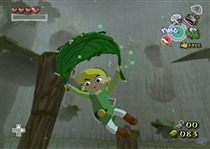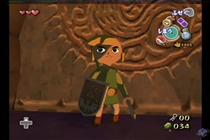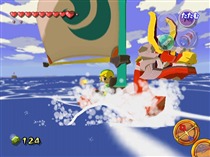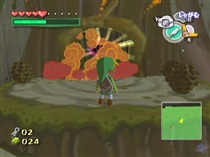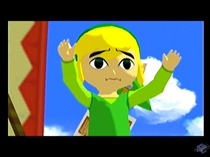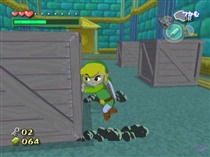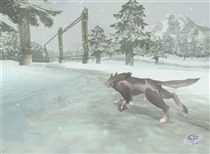We take a look back at the games worthy enough to be considered the GameCube's best.


The Legend of Zelda: The Wind Waker
March 24, 2003
Developed by Nintendo
Published by Nintendo
Retrospective by Karl Castaneda
When the GameCube was unveiled at Space World 2000, the system was accompanied by a plethora of tech demos showing off its horsepower. In one of them, we saw a strikingly realistic Link battle Ganondorf, and soon afterwards, the short trailer was billed as the next iteration of the series. One year later, "next-gen Zelda" was shown again, but this time, we saw a drastically younger hero and a graphical style that looked more akin to a cartoon than what we’d seen previously. Nicknamed "Celda," it would eventually get its proper respects when journalists were given a chance to play it at E3 2002, ending any supposition that it would be anything less than epic.
Released in the United States as The Wind Waker, the game is easily one of the best titles of the generation, GameCube or otherwise. While we once again see Link on a quest to defeat Ganondorf and free the world from evil, the setting breaks the boundaries of Hyrule. The entire world has been flooded, and as such, lush, tropical islands fill the already colorful game with a bright and stylized look.
Gameplay-wise, the musical theme from Ocarina of Time is continued, this time with an enchanted baton (the Wind Waker from which the game takes its name) – by conducting the winds with the C-Stick, Link can employ a variety of techniques, from breaking down barriers in dungeons to teleporting around the world via cyclones. That last part comes in quite handy, since Link has to sail from island to island with his boat, the ever-talkative King of Red Lions (essentially the replacement for Epona).
What always made Wind Waker great for me was the way the game brought everything together into an emotional experience. The way the settings complimented the characters gave it a very Miyazaki-like feel, especially at the end (which I won’t spoil for those of you who haven’t gotten around to playing it), which arguably shows more humanity in Link than any of his other appearances.
All in all, it was a spectacular entry to the series, and one that anyone would do well to pick it up if they hadn’t already. I can say, with all certainty (perhaps more than any other game on the system), that they won’t be disappointed.
Thoughts From the NWR Staff
Steven Rodriguez: "While playing Wind Waker, I had the first awe-inspiring moment of my gaming career. As I was going through the Earth Temple and solving the different light-based puzzles, I came to realize what a perfect experience it was. The feeling I encountered was one I had never experienced before, and have yet to experience again. It was just something special, and I'll never forget it."
Evan Burchfield: "Wind Waker was the first Zelda game to have a true sense of scale, and it is much criticized for it. Though the ocean is large, indeed very large, the criticism is unwarranted - there is always something to do in this ocean and the depth of the overworld exploration is unprecedented for a game of this type. Of course, it is a staggeringly beautiful overworld as well, but that's not important to many (some gamers will never be satisfied). The development team utilized the GameCube hardware to create a progressive draw-in system that eliminated loading and kept the gigantic world cohesive, making Wind Waker the most visually engrossing GameCube game to date, (a similar system was later used in Shadow of the Colossus). Wind Waker's immense beauty as well as its willingness to hold a fresh perspective on what makes Zelda Zelda make it the best Zelda game to date as well."
Daniel Bloodworth: "When I first got my Japanese copy of Wind Waker, I didn't even make it past the opening scene without hooking it up to my PC and recording the stunning music. Zelda soundtracks are some of the most satisfying, and Wind Waker continued that tradition, introducing a voice that often mirrored the more light hearted nature of the game but still captured your heart in a sense of grand adventure and deep history. There are a lot of dynamic effects that can never be experienced in a soundtrack like the way more instruments are added to the song when you put up your sail on the high seas or the brilliant musical flourishes during battle."
Ryan Winterhalter: "Wind Waker was hands down the game of the year for 2003 and I bought my GameCube specifically to play it. Everything was going well until I had to fetch the tri-force pieces. The quest was the only black mark on an otherwise perfect game."
David Trammell: "I loved everything about Wind Waker the first time I played it. In particular the art style was fully realized, the music was wonderful and the story was exceptionally engaging and fresh. I replayed the game years later and the only thing that didn't hold up was the oceans. They can ultimately seem excessively large, and the King of Red Lions slow and decrepit."
Jonathan Metts: "This is going to sound sappy, but when I first played the Japanese version of Wind Waker (months earlier than the English version), I was playing around Link's home island when I looked up and saw the clouds wisping by and seagulls playing in the wind. Very suddenly, and to my surprise, I was overcome with emotion at the purity of this beautiful world which would inevitably lose its innocence as soon as the real quest began. Part of me wanted to stay right there and never let the game's plot corrupt that wonderful, serene place. It still amazes me that the Zelda series made such a smooth transition to earnest, emotional storytelling, and it did so not with great writing but through sheer artistry."
Mike Sklens: "This is another game that gets a lot of flack. If you ask me, it looks more like a Zelda game any any other Zelda game. The cel-shaded style perfectly re-creates the Link we learned to love on the NES and SNES."
Lasse Pallesen: "I found the sailing portion boring and repetitive, the difficulty level far too low, and the whole collect-a-thon bit at the end to be a nightmare. For these reasons, Wind Waker can’t be on my top 5 list of the greatest Zelda games of all time. However, it’s still a wonderful game with beautiful music and art direction. The cel-shaded graphics manage to convey an extraordinary sense of emotion so rarely felt in video games. Like Jonny, I think that the sequence where Link is leaving his home island truly stands out in this regard."
Aaron Kaluszka: "I was late to the N64 party and didn't end up playing Ocarina of Time until the Master Quest Bonus Disc came out. I didn't have a chance to finish the game before Wind Waker arrived, and that game made it so hard to go back to Ocarina. The artistic design and storytelling were simply unparalleled.
On the night I reached Ganon's Tower, a few people trickled into my dorm to watch me play. As 1 AM passed, I finally reached the top. My room ended up packed with at least nine people watching me face off with Ganon despite others' attempts to lure them away. I hadn't stocked up on any recovery items since I hadn't actually intended to beat the game that night, but I rose to complete the task. Many of those people won't ever play the game, so I'm glad they were able to experience that the game with me in those early hours in March."
The game that Wind Waker was supposed to be turned up again in 2004, when Nintendo showed E3 attendees the trailer for Zelda: Twilight Princess. From that very first showing, it wowed crowds with its more realistic graphics and a more serious atmosphere. At next year's E3, Zelda again stole the show as a playable demo. All that was left was the game's October 2005 release.
Typically, Nintendo delayed it. However, it wasn't an ordinary delay; the GameCube's 2006 lineup was bare-bones, and the Revolution was looming. Was Nintendo moving the game to the Wii? Would they screw over GameCube owners with another generational port? Yes and no. Although the GC version was still on, Nintendo basically ignored it, favoring to tout it as a Wii launch title first and foremost. Twilight Princess eventually released on the GameCube three weeks after the Wii launched in North America.
When people finally got their hands on the mini-disc version of the new Zelda, what they got was a game like no other. It was the biggest, most ambitious adventure game in Nintendo's history. The extra time from the original delay was primarily used to fit the game's controls to the Wii controller, but the game itself underwent some pretty big changes from when it was last seen at E3 '05, particularly to the Twilight areas. The finished product cannot be praised enough for its excellence in just about every area.
But is one of the GameCube's Greatest Games? By our criteria, it's not really; you don't need a GameCube to play it, nor did you ever need one (as it eventually turned out). Due to that technicality, it's not on our main list. Even though it's one of the best games ever made, for any platform, it will probably forever be remembered as a Wii launch title instead of GameCube's last hurrah. It must have been hard for GC owners needing to sit around, seeing new Wii owners slashing their way through the game they should have had the year before, but at least the wait was worth it. Boy oh boy, was it worth it.
